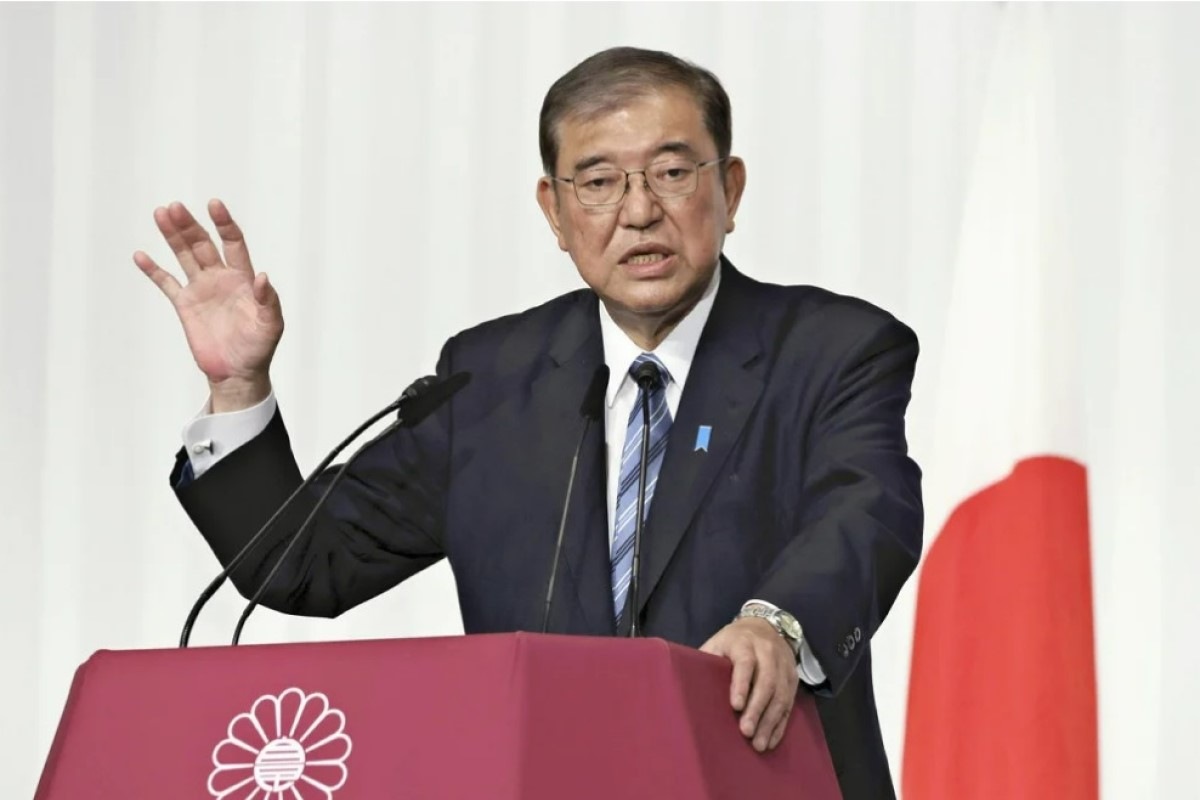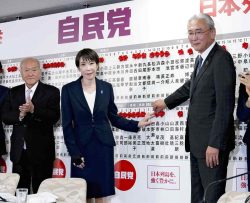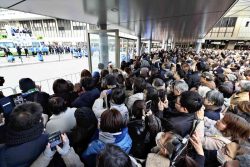Japan Election: Japan’s Ruling Bloc Suffers Crushing Defeat in Election; Combined 215 Seats Fall Short of Lower House Majority

Prime Minister Shigeru Ishiba holds a press conference in Tokyo on Monday.
17:51 JST, October 28, 2024
A series of “politics and money” scandals drove the Liberal Democratic Party to a crushing defeat in Sunday’s House of Representatives election. The LDP secured only 191 seats, 56 fewer than it held before the lower house was dissolved.
Even combined with the seats earned by its coalition partner Komeito, the ruling bloc now holds 215 seats, not enough for a majority in the 465-seat lower house.
Komeito has 24 seats, down eight from its pre-dissolution figure, and its leader Keiichi Ishii was defeated in his constituency. In the previous 2021 election, Komeito fielded candidates in nine constituencies and won all of them. But this time, 11 candidates ran in single-seat constituencies, and only four won.
DPFP quadruples seats to 28
In contrast, the opposition Constitutional Democratic Party of Japan increased its seats significantly from 98 to 148, while the Democratic Party for the People quadrupled its number to 28. The Japan Innovation Party earned all 19 seats in Osaka constituencies but fought uphill battles outside the Kansai region, ultimately losing six seats to now hold 38.
The massive defeat of the ruling coalition is expected to create a battle over the framework of the government, possibly changing the political situation. What the DPFP and the JIP do in that battle will garner much attention.
It was the first time since the 2009 lower house election that the ruling coalition failed to secure a majority. Nevertheless, the LDP managed to be the largest party.
Prime Minister Shigeru Ishiba expressed on Monday his intention to remain in office despite the defeat of the ruling bloc.
“National politics cannot be allowed to stagnate, even for a moment, in this severe security and economic environment,” said Ishiba, who is also president of the LDP, during a press conference at the party’s headquarters on the day. “We received an extremely harsh judgment from the public. It is deeply regrettable that we have lost so many valuable members of the LDP and Komeito.”
However, he said, “I want to fulfill my duty to protect Japan and its people.”
Regarding the issue of “money in politics,” Ishiba said, “I will eliminate ‘inner circle and party thinking’ and strive for party reform.”
Koizumi resigns
To take responsibility for the heavy defeat, Shinjiro Koizumi, who chairs the LDP Election Strategy Committee, submitted Monday a letter of resignation, which was accepted by the party.
CDPJ President Yoshihiko Noda on Monday reported the result of Sunday’s election to Tomoko Yoshino, president of the Japanese Trade Union Confederation (Rengo) at Rengo’s headquarters in Tokyo.
“We were able to drive the ruling coalition down to below a majority, and that’s a certain achievement,” Noda told reporters after his meeting with Yoshino. “There are lots of things we need to do, including the special Diet session and a House of Councillors election [next summer].”
PM likely to court DPFP
With the LDP and Komeito failing to maintain a majority, the administration will certainly become unstable. A special Diet session will be convened within 30 days after the election, and the Diet’s vote on the prime minister will be held. Even if Ishiba is reelected, the ruling coalition will fall into a minority.
To advance important policies, Ishiba will likely seek cooperation from the DPFP among others.
DPFP leader Yuichiro Tamaki is reluctant to join hands with the LDP, saying, “Once we’re in power, we’ll have to agree to things we don’t necessarily agree with.”
Ishiba is expected to seek a “partial coalition,” in which he asks for cooperation on a policy-by-policy basis.
Noda also intends to seek support of the DPFP and the JIP in the Diet’s vote on the prime minister. If Ishiba does not win a majority, a runoff vote will be held between the top two candidates.
In Sunday’s election, Reiwa Shinsengumi gained six more seats before the lower house dissolution to nine, the Japanese Communist Party secured eight seats, down two from before the dissolution. The Social Democratic Party retained one seat and Sanseito got two more seats to secure three in total.
Top Articles in Politics
-

Japan PM Takaichi’s Cabinet Resigns en Masse
-

Sanae Takaichi Elected Prime Minister of Japan; Keeps All Cabinet Appointees from Previous Term
-

Japan’s Govt to Submit Road Map for Growth Strategy in March, PM Takaichi to Announce in Upcoming Policy Speech
-

LDP Wins Historic Landslide Victory
-

LDP Wins Landslide Victory, Secures Single-party Majority; Ruling Coalition with JIP Poised to Secure Over 300 seats (UPDATE 1)
JN ACCESS RANKING
-

Japan PM Takaichi’s Cabinet Resigns en Masse
-

Japan Institute to Use Domestic Commercial Optical Lattice Clock to Set Japan Standard Time
-

Israeli Ambassador to Japan Speaks about Japan’s Role in the Reconstruction of Gaza
-

Man Infected with Measles Reportedly Dined at Restaurant in Tokyo Station
-

Videos Plagiarized, Reposted with False Subtitles Claiming ‘Ryukyu Belongs to China’; Anti-China False Information Also Posted in Japan






















